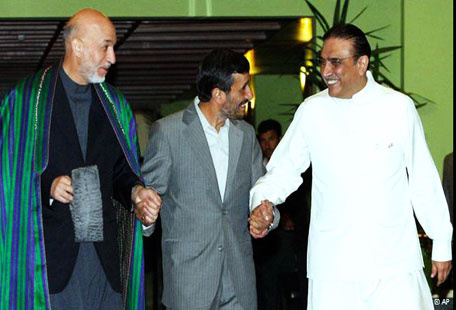Iran’s Policies in Afghanistan in 1390 (March 21, 2011-March 20, 2012)
Steps towards Regional Security

The most important event in Iran’s policies in Afghanistan was Iran’s initiative to hold a trilateral meeting between Iran, Afghanistan, and Pakistan, once in Tehran (July 2011) and once in Islamabad (February 2012). In fact, the assassination of Borhanuddin Rabbani, the head of the High Council of Peace of Afghanistan-- one of the bitter events of 1390-- caused tension in relations between Pakistan and Afghanistan, and Western countries, especially the US, played an important role in aggravating the situation. These trilateral meetings helped mitigate the differences between Kabul and Islamabad to a large extent, and this has had a positive effect on strengthening security and stability in the region. We believe that peace and reconciliation in Afghanistan can only be achieved through continuous talks between Afghan groups, and despite Rabbani’s martyrdom, the High Council of Peace of Afghanistan, which has the support of the country’s president, needs to remain active and play its role in achieving a comprehensive peace. If different ethnicities, religious groups, and political parties in Afghanistan learn to cooperate and think in terms of national interests, they will create the proper platform for a safe and uniform Afghanistan.
Afghanistan’s neighbors, including Iran and Pakistan, can actively and responsibly play their role in this matter. Iran’s active presence in the two meetings held in Istanbul and Bonn (at the level of Foreign Minister) was also of great importance in the year 1390. Iran’s participation in the two segments of these meetings—in drafting documents as well as its presence at the meetings—can be considered a symbol of Tehran’s focus on regional and international initiatives with regard to Afghanistan. The inclusion of Iran’s viewpoints in the final documents of the Istanbul and Bonn meetings was also a sign of our country’s pivotal and effective role. The reason and motivation for the attention that regional countries paid to the regional meeting on Afghanistan in Istanbul was the failure of countries outside of the region, and more specifically NATO members, to establish security in Afghanistan during their 10-year presence in the country. In other words, the Istanbul meeting was the initial move for these countries, especially the immediate neighbors, to cooperate in the future of security in this country.
News of US negotiations with the Taliban in Doha was also of importance in the past year, and it prepared the ground for the establishment of a Taliban office in Qatar. However, these were not particularly successful, considering the pre-conditions both sides had set for each other. On one hand, the Taliban demands that the US and NATO leave Afghanistan and release Taliban prisoners held in Guantanamo and other prisons. On the other hand, the United States’ condition is for the Taliban to cut its ties with Al-Qaida, cease its armed activities, and turn into a political group and party. Therefore, considering the situation and the fact that the US is in charge of leading these negotiations, there neither has been nor is there now any hope for these talks. Iran has not approved these negotiations and has doubts about America’s goals and intentions in negotiating with the Taliban. This is because it believes these talks will not help achieve peace and security in Afghanistan. Iran has consistently showed its support for dialogue between Afghans within the framework of the High Council of Peace. Iran is of the opinion that the US has no intention to establish peace and security in Afghanistan and wants to extend its presence in this country in any way possible.
The Americans seek to convince the Taliban to give them the green light to have a permanent and long-term presence in Afghanistan, and to maintain their bases in the country. On the other hand, the US looks to change the Taliban’s image in world public opinion so as to strengthen Obama’s standing in that country’s upcoming presidential elections. However, it seems the biggest winner of the negotiations between the Taliban and the US has been the Taliban, which has been able to strengthen its position and restore its negative reputation in world public opinion.
Nevertheless, in 1390 not only did worries about the security agreement between Afghanistan and the US persist for countries in the region, but American spy operations by a drone (which had left from Afghanistan) and the arrest of another spy who was deployed to Iran from the Bagram military base, doubled these worries for Iran. The Americans, who have bases, equipment, assets, and forces in Afghanistan, seek to sign a security agreement with Afghanistan so as to legalize their military bases, but due to the difference of opinion with the Karzai government and the opposition of public opinion, they have yet to have any success. Considering American soldiers’ sacrilegious actions against the Qur’an and the Afghan people’s widespread demonstrations against American actions and presence, it appears a bit far-fetched to think that understandings between Kabul and Washington concerning the signing of a strategic treaty will come to fruition.

